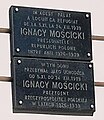Ignacy Mościcki

 Clash Royale CLAN TAG#URR8PPP
Clash Royale CLAN TAG#URR8PPP | Ignacy Mościcki | |
|---|---|
 | |
| 4th President of the Republic of Poland 3rd President of the Second Polish Republic | |
In office 4 June 1926 – 30 September 1939 | |
| Prime Minister | See list
|
| Preceded by | Stanisław Wojciechowski |
| Succeeded by | Władysław Raczkiewicz (President of the Polish Republic in Exile) |
| Personal details | |
| Born | (1867-12-01)1 December 1867 Mierzanowo, Congress Poland |
| Died | 2 October 1946(1946-10-02) (aged 78) Versoix, Switzerland |
| Political party | Proletariat (until 1892) |
| Spouse(s) | Michalina Czyżewska (d.1932) Maria Dobrzańska (m.1933) |
| Children | 4 |
| Profession | Chemist |
| Signature | |
Ignacy Mościcki (Polish pronunciation: [iɡˈnatsɨ mɔɕˈtɕitskʲi]; 1 December 1867 – 2 October 1946) was a Polish chemist, politician, and President of Poland from 1926 to 1939. He was the longest serving President in Poland's history.[1]
Contents
1 Biography
2 Gallery
3 See also
4 Notes
5 External links
Biography
Ignacy Mościcki was born on 1 December 1867 in Mierzanowo, a small village near Ciechanów, Congress Poland. After completing school in Warsaw, he studied chemistry at the Riga Polytechnicum. There he joined the Polish underground leftist organization, Proletariat.
On graduating, he returned to Warsaw, but was threatened by the Tsarist secret police with life imprisonment in Siberia and was forced to emigrate in 1892 to London. In 1896 he was offered an assistantship at the University of Fribourg in Switzerland. There he patented a method for cheap industrial production of nitric acid.
In 1912 Mościcki moved to Lemberg (Polish: Lwów; modern Lviv, Ukraine), in the Kingdom of Galicia and Lodomeria within the Austro-Hungarian Empire, where he accepted a chair in physical chemistry and technical electrochemistry at the Lemberg Polytechnic.[2] In 1925 he was elected rector of the Lwów Polytechnic (as it was now called), but soon moved to Warsaw to continue his research at the Warsaw Polytechnic.

Mościcki bestows the bulawa (the Marshal of Poland's baton) on Edward Rydz-Śmigły

Brussels, Mościcki Avenue
After Józef Piłsudski's May 1926 coup d'état, on 1 June 1926, Mościcki – an erstwhile associate of Piłsudski's in the Polish Socialist Party – was elected president of Poland by the National Assembly, on Piłsudski's recommendation (after Piłsudski himself refused the office).
As president, Mościcki was subservient to Piłsudski, never openly showing dissent from any aspect of the Marshal's leadership. After Piłsudski's death in 1935, Piłsudski's followers divided into three main factions: those supporting Mościcki as Piłsudski's successor; those supporting General Edward Rydz-Śmigły; and those supporting Prime Minister Walery Sławek.
With a view to eliminating Sławek from the game, Mościcki concluded a power-sharing agreement with Rydz-Śmigły, which saw Sławek marginalized as a serious political player by the end of the year. As a result of this agreement, Rydz-Śmigły would become the de facto leader of Poland until the outbreak of the war, while Mościcki remained influential by continuing in office as president.
Mościcki was the leading moderate figure in the regime, which was referred to as the "colonels' government" due to the major presence of military officers in the Polish government. Mościcki opposed many of the nationalist excesses of the more right-wing Rydz-Śmigły, but their pact remained more or less intact.
Mościcki remained president until September 1939, when he was interned in Romania[3] and was forced by France to resign his office. He transferred the office to General Bolesław Wieniawa-Długoszowski, who held it for only one day before General Władysław Sikorski and the French government ousted him in favor of Władysław Raczkiewicz.
In December 1939 Mościcki was released and allowed to move to Switzerland, where he remained through World War II. He died at his home near Geneva on 2 October 1946.
Gallery

President of Poland in around 1928

President Mościcki in his office, 1934

April's Constitution
Session of the Polish Academy of Literature in 1933

Plaque commemorating Mościcki's stay as a refugee in the Mihail Palace in Romania.
See also
- Invasion of Poland
- Mościce
- List of Poles
Notes
^ August Zaleski was president of the Polish Government in Exile for 25 years, from 1947 until his death.
^ Norman Davies, God's Playground, vol. II, Oxford University Press, 1986, .mw-parser-output cite.citationfont-style:inherit.mw-parser-output qquotes:"""""""'""'".mw-parser-output code.cs1-codecolor:inherit;background:inherit;border:inherit;padding:inherit.mw-parser-output .cs1-lock-free abackground:url("//upload.wikimedia.org/wikipedia/commons/thumb/6/65/Lock-green.svg/9px-Lock-green.svg.png")no-repeat;background-position:right .1em center.mw-parser-output .cs1-lock-limited a,.mw-parser-output .cs1-lock-registration abackground:url("//upload.wikimedia.org/wikipedia/commons/thumb/d/d6/Lock-gray-alt-2.svg/9px-Lock-gray-alt-2.svg.png")no-repeat;background-position:right .1em center.mw-parser-output .cs1-lock-subscription abackground:url("//upload.wikimedia.org/wikipedia/commons/thumb/a/aa/Lock-red-alt-2.svg/9px-Lock-red-alt-2.svg.png")no-repeat;background-position:right .1em center.mw-parser-output .cs1-subscription,.mw-parser-output .cs1-registrationcolor:#555.mw-parser-output .cs1-subscription span,.mw-parser-output .cs1-registration spanborder-bottom:1px dotted;cursor:help.mw-parser-output .cs1-hidden-errordisplay:none;font-size:100%.mw-parser-output .cs1-visible-errorfont-size:100%.mw-parser-output .cs1-subscription,.mw-parser-output .cs1-registration,.mw-parser-output .cs1-formatfont-size:95%.mw-parser-output .cs1-kern-left,.mw-parser-output .cs1-kern-wl-leftpadding-left:0.2em.mw-parser-output .cs1-kern-right,.mw-parser-output .cs1-kern-wl-rightpadding-right:0.2em
ISBN 0-19-821944-X, p. 422.
^ Stanislaw Mikolajczyk, The Pattern of Soviet Domination, Sampson Low, Marston & Co., 1948, p. 6.
External links
"Ignacy Mościcki (1867–1946)". poland.gov.pl. Retrieved 20 August 2011.
"Ignacy Mościcki". president.pl. Retrieved 20 August 2011.
"Ignacy Mościcki". Encyclopædia Britannica. Retrieved 20 August 2011.
Newspaper clippings about Ignacy Mościcki in the 20th Century Press Archives of the German National Library of Economics (ZBW)
| Political offices | ||
|---|---|---|
| Preceded by Maciej Rataj | President of Poland 1926–1939 | Succeeded by Bolesław Wieniawa-Długoszowski as President of the Polish Republic in Exile |
Vacant Title next held by Bolesław Bierut | ||





